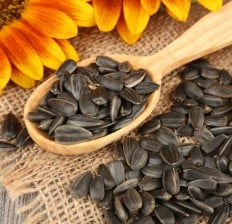Sunflower 🌻 in my kitchen garden that's look like raincoat having seven colors
 Sunflower seeds are a unique food, rich in many types of essential, and sometimes hard to get, nutrients. In fact, sunflower seeds make my Top 10 List for foods rich in Sunflower seeds are a unique food, rich in many types of essential, and sometimes hard to get, nutrients. In fact, sunflower seeds make my Top 10 List for foods rich in Vitamin E,copper, B Vitamins like thiamine, phosphorus, selenium, and more.
Sunflower seeds are a unique food, rich in many types of essential, and sometimes hard to get, nutrients. In fact, sunflower seeds make my Top 10 List for foods rich in Sunflower seeds are a unique food, rich in many types of essential, and sometimes hard to get, nutrients. In fact, sunflower seeds make my Top 10 List for foods rich in Vitamin E,copper, B Vitamins like thiamine, phosphorus, selenium, and more.
 Sunflower seeds are an excellent source of many vital nutrients including Vitamin E, also known as gamma-tocopherol. Vitamin E is a powerful antioxidant that is found in many nuts and seeds, but sunflower seeds are one of the best natural sources of this antioxidant, which works hard to fight free radical damage within the body.
Sunflower seeds are an excellent source of many vital nutrients including Vitamin E, also known as gamma-tocopherol. Vitamin E is a powerful antioxidant that is found in many nuts and seeds, but sunflower seeds are one of the best natural sources of this antioxidant, which works hard to fight free radical damage within the body.
 Sunflower seeds are a unique food, rich in many types of essential, and sometimes hard to get, nutrients. In fact, sunflower seeds make my Top 10 List for foods rich in Sunflower seeds are a unique food, rich in many types of essential, and sometimes hard to get, nutrients. In fact, sunflower seeds make my Top 10 List for foods rich in Vitamin E,copper, B Vitamins like thiamine, phosphorus, selenium, and more.
Sunflower seeds are a unique food, rich in many types of essential, and sometimes hard to get, nutrients. In fact, sunflower seeds make my Top 10 List for foods rich in Sunflower seeds are a unique food, rich in many types of essential, and sometimes hard to get, nutrients. In fact, sunflower seeds make my Top 10 List for foods rich in Vitamin E,copper, B Vitamins like thiamine, phosphorus, selenium, and more.
Sunflower seeds, like nearly all types of nuts and seeds, provide a healthy source of essential fatty acids; their specific fatty acids are in the form of linoleic acid. Additionally, sunflower seeds are also an excellent source of fiber, amino acids (especially tryptophan) which make up the building blocks of proteins, B Vitamins, phytosterols, and more.

Although as a culture we have been led to believe that consuming fat can lead to unwanted weight gain, the opposite is in fact true; consuming healthy fats actually leads to a healthy cardiovascular system, a stable healthy body weight, and reduced levels of body-wide inflammation.
Healthy sources of fats like those found in sunflower seeds are actually the building blocks for cell membranes, allow your body to balance hormones, help to slow down absorption of food during meal time so that we can go longer without feeling hungry, and also act as carriers for important fat- soluble vitamins A, D, E and K.
By adding healthy sources of fats into your diet, like the polyunsaturated kind that is found in sunflower seeds, and replacing trans-fats and low-quality easily oxidized fats, you can experience multiple health benefits.
Sunflower Seeds History
Sunflower seeds come from, of course, sunflowers! The yellow flowers produce small edible seeds which are gray or greenly colored and are found naturally in dark green, gray, or black shells called “husks”.
According to the National Sunflower Association, Sunflowers are actually native to North America. There is evidence that sunflowers were cultivated by native Americans as long as 3000 B.C! However, they were first discovered and taken to Europe, and then spread to Russia where they were first commercialized as a crop and harvested for their oil. It wasn’t until the late 1800’s that they were brought back to North America where they are popular for their oil, seeds, and as a beautiful addition to your garden.
 Sunflower seeds are an excellent source of many vital nutrients including Vitamin E, also known as gamma-tocopherol. Vitamin E is a powerful antioxidant that is found in many nuts and seeds, but sunflower seeds are one of the best natural sources of this antioxidant, which works hard to fight free radical damage within the body.
Sunflower seeds are an excellent source of many vital nutrients including Vitamin E, also known as gamma-tocopherol. Vitamin E is a powerful antioxidant that is found in many nuts and seeds, but sunflower seeds are one of the best natural sources of this antioxidant, which works hard to fight free radical damage within the body.
Sunflower seeds are most highly correlated with boosting cardiovascular health thanks to their ability to reduce “bad” LDL cholesterol and to prevent hypertension, in addition to many other positive effects like cancer prevention, less headaches and muscle cramps, improved detoxification, healthy skin, and more.
Sunflower Seeds Nutrition
A ¼ cup serving of sunflower seeds provides (in value recommended values): 190 calories, 16 grams of fat, 6 grams of protein, and 4 grams of fiber
- 82% of Vitamin E
- 70% DV of copper
- 43% Vitamin B1 (thiamine)
- 34% of manganese
- 34% of selenium
- 33% of phosphorus
- 28% of magnesium
- 28% of Vitamin B6
- 20% of folate
- 18% of Vitamin B3
No comments:
Post a Comment